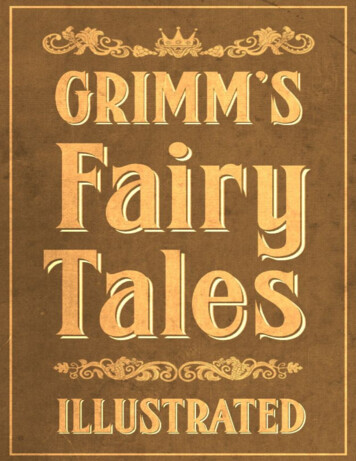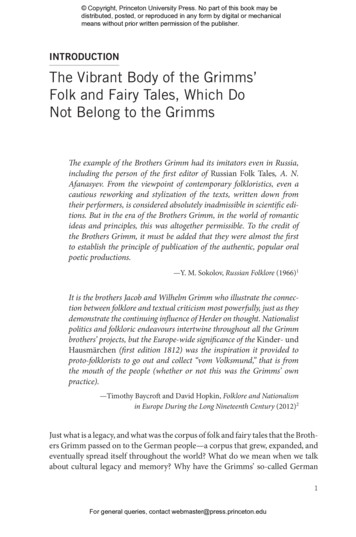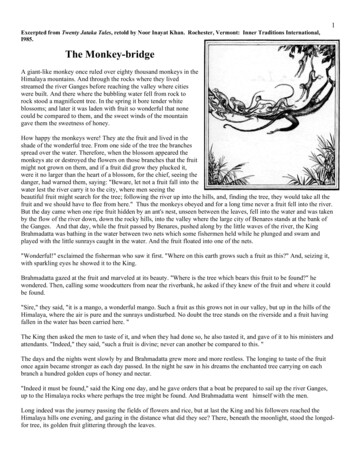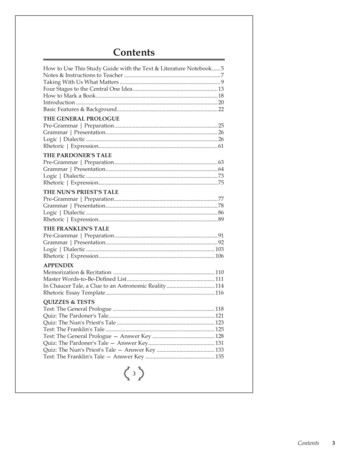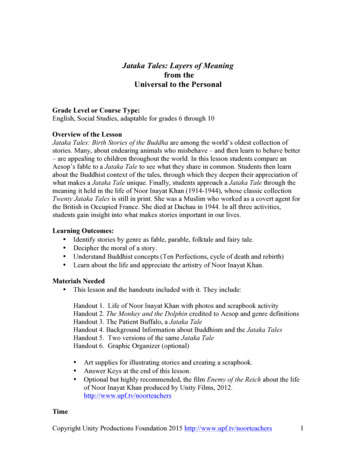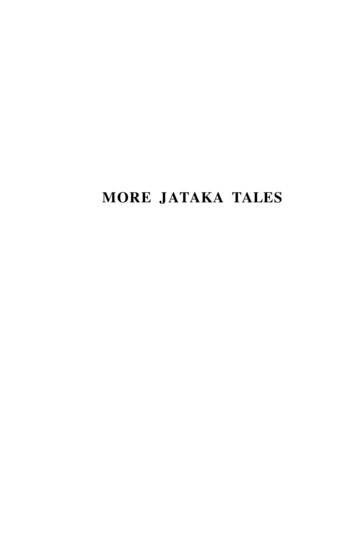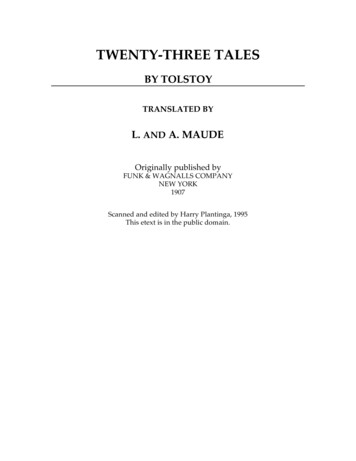
Transcription
TWENTY-THREE TALESBY TOLSTOYTRANSLATED BYL. AND A. MAUDEOriginally published byFUNK & WAGNALLS COMPANYNEW YORK1907Scanned and edited by Harry Plantinga, 1995This etext is in the public domain.
PREFACETHIS volume is divided into seven parts.First we have Tales for Children, published about the year 1872, andreminding us of the time when Tolstoy was absorbed in efforts to educate thepeasant children. This section of the book contains the two stories which of allthat he has written Tolstoy likes best. In What is Art? he claims no place amongexamples of good art for any of his own productions 'except for the story God seesthe Truth, but Waits, which seeks a place in the first class (religious art), and APrisoner in the Caucasus, which belongs to the second (universal art).' In the first ofthese the subject (a favourite one with Tolstoy) is the forgiveness of injuries. Thesecond deals with the simplest feelings common to all men: fear and courage,pity, endurance, &c.' expressed with that individuality, clearness, and sincerity,which Tolstoy says are the signs of true art.Part II contains a series of stories written for the people; and among themWhat Men Live By, probably the most widely circulated of all Tolstoy's tales. It isfounded on the oft-repeated legend of an angel sent by God to live for a whileamong men.Part III consists of a Fairy Tale, Iván the Fool, which contains in popularform Tolstoy's indictment of militarism and commercialism.Part IV contains three short stories written to help the sale of cheapreproductions of some good drawings; Tolstoy having for many years beenanxious by all means in his power to further the circulation, at a cheap price, ofgood works of pictorial as well as literary art.In Part V we have a series of Russian Folk-Tales. The gems of thiscollection are the temperance story, The Imp and the Crust, the anti-war story, TheEmpty Drum, and another story, How Much Land does a Man Need? which dealswith a peasant's greed for land. A Grain as big as a Hen's Egg and The Godson arehighly characteristic of the spirit of the Russian peasantry, and supply a glimpseof the sources from whence Tolstoy imbibed many of his own spiritualsympathies and antipathies.Part VI gives two adaptations from the French which have appeared in noprevious English edition of Tolstoy's works. They are not merely translations, forto some extent Tolstoy when translating them, modified them and made them hisown.Part VII consists of stories Tolstoy contributed in aid of the Jews leftdestitute after the massacres and outrages in Kishinéf and elsewhere in Russia in1903, -- outrages which were forerunners of the yet more terrible Jewishmassacres of 1905.The importance Tolstoy attributes to literature of the kind contained inthis volume, is shown by the following passage in What is Art? -'The artist of the future will understand that to compose a fairy tale, alittle song which will touch a lullaby or a riddle which will entertain, a jest2
which will amuse, or to draw a sketch such as will delight dozens ofgenerations or millions of children and adults, is incomparably moreimportant and more fruitful than to compose a novel, or a symphony, orpaint a picture, of the kind which diverts some members of the wealthyclasses for a short time and is then for ever forgotten. The region of this artof the simplest feelings accessible to all is enormous, and it is as yet almostuntouched.'The sections of the book have been arranged in chronological order. Thedate when each story was published is given. The translations are new ones, andfor the footnotes I am responsible.AYLMER MAUDE.GREAT BADDOWCHELMSFORD.February 1, 1906.3
CONTENTSPREFACEPART I: TALES FOR CHILDREN: PUBLISHED ABOUT 1872.1. GOD SEES THE TRUTH, BUT WAITS2. A PRISONER IN THE CAUCASUS3. THE BEAR-HUNTPART II: POPULAR STORIES.4. WHAT MEN LIVE BY (1881)5. A SPARK NEGLECTED BURNS THE HOUSE (1885)6. TWO OLD MEN (1885)7. WHERE LOVE IS, GOD IS (1885)PART III: A FAIRY TALE.8. THE STORY OF IVÁN THE FOOL (1885)PART IV: STORIES WRITTEN TO PICTURES (1885).9. EVIL ALLURES, BUT GOOD ENDURES10. LITTLE GIRLS WISER THAN MEN11. ILYÁSPART V: FOLK-TALES RETOLD.12. THE THREE HERMITS (1886)13. THE IMP AND THE CRUST (1886)14. HOW MUCH LAND DOES A MAN NEED? (1886)15. A GRAIN AS BIG AS A HEN'S EGG (1886)16. THE GODSON (1886)17. THE REPENTANT SINNER (1886)18. THE EMPTY DRUM (1891)PART VI: ADAPTATIONS FROM THE FRENCH.19. THE COFFEE HOUSE OF SURAT (1893)20. TOO DEAR (1897)PART VII: STORIES GIVEN TO AID THE PERSECUTED JEWS (1903).21. ESARHADDON, KING OF ASSYRIA22. WORK, DEATH AND SICKNESS23. THREE QUESTIONS4
TALES FOR CHILDREN1GOD SEES THE TRUTH, BUT WAITSIN the town of Vladímir lived a young merchant named Iván DmítritchAksyónof. He had two shops and a house of his own.Aksyónof was a handsome, fair-haired, curly-headed fellow, full of fun,and very fond of singing. When quite a young man he had been given to drink,and was riotous when he had had too much, but after he married he gave updrinking, except now and then.One summer Aksyónof was going to the Nízhny Fair, and as he badegood-bye to his family his wife said to him, 'Iván Dmítritch, do not start to-day; Ihave had a bad dream about you.'Aksyónof laughed, and said, 'You are afraid that when I get to the fair Ishall go on the spree.'His wife replied: 'I do not know what I am afraid of; all I know is that Ihad a bad dream. I dreamt you returned from the town, and when you took offyour cap I saw that your hair was quite grey.'Aksyónof laughed. 'That's a lucky sign,' said he. 'See if I don't sell out allmy goods, and bring you some presents from the fair.'So he said good-bye to his family, and drove away.When he had travelled half-way, he met a merchant whom he knew, andthey put up at the same inn for the night. They had some tea together, and thenwent to bed in adjoining rooms.It was not Aksyónof's habit to sleep late, and, wishing to travel while itwas still cool, he aroused his driver before dawn, and told him to put in thehorses.Then he made his way across to the landlord of the inn (who lived in acottage at the back), paid his bill, and continued his journey.When he had gone about twenty-five miles, he stopped for the horses tobe fed. Aksyónof rested awhile in the passage of the inn, then he stepped out intothe porch and, ordering a samovár1 to be heated got out his guitar and began toplay.Suddenly a tróyka2 drove up with tinkling bells, and an official alighted,followed by two soldiers. He came to Aksyónof and began to question him,asking him who he was and whence he came. Aksyónof answered him fully, andsaid, 'Won't you have some tea with me?' But the official went on crossquestioning him and asking him, 'Where did you spend last night? Were youalone, or with a fellow-merchant? Did you see the other merchant this morning?Why did you leave the inn before dawn?'1 The samovár ('self-boiler') is an urn in which water can be heated and kept on the boil.2 A three-horse conveyance.5
Aksyónof wondered why he was asked all these questions, but hedescribed all that had happened, and then added, 'Why do you cross-questionme as if I were a thief or a robber? I am travelling on business of my own, andthere is no need to question me.'Then the official, calling the soldiers, said, 'I am the police-officer of thisdistrict, and I question you because the merchant with whom you spent lastnight has been found with his throat cut. We must search your things.'They entered the house. The soldiers and the police-officer unstrappedAksyónof's luggage and searched it. Suddenly the officer drew a knife out of abag, crying, 'Whose knife is this?'Aksyónof looked, and seeing a blood-stained knife taken from his bag, hewas frightened.'How is it there is blood on this knife?'Aksyónof tried to answer, but could hardly utter a word, and onlystammered: 'I -- I don't know -- not mine.'Then the police-officer said, 'This morning the merchant was found in bedwith his throat cut. You are the only person who could have done it. The housewas locked from inside, and no one else was there. Here is this bloodstainedknife in your bag, and your face and manner betray you! Tell me how you killedhim, and how much money you stole?'Aksyónof swore he had not done it; that he had not seen the merchantafter they had had tea together; that he had no money except eight thousandroubles3 of his own, and that the knife was not his. But his voice was broken, hisface pale, and he trembled with fear as though he were guilty.The police-officer ordered the soldiers to bind Aksyónof and to put him inthe cart. As they tied his feet together and flung him into the cart, Aksyónofcrossed himself and wept. His money and goods were taken from him, and hewas sent to the nearest town and imprisoned there. Enquiries as to his characterwere made in Vladímir. The merchants and other inhabitants of that town saidthat in former days he used to drink and waste his time, but that he was a goodman. Then the trial came on: he was charged with murdering a merchant fromRyazán, and robbing him of twenty thousand roubles.His wife was in despair, and did not know what to believe. Her childrenwere all quite small; one was a baby at her breast. Taking them all with her, shewent to the town where her husband was in gaol. At first she was not allowed tosee him; but, after much begging, she obtained permission from the officials, andwas taken to him. When she saw her husband in prison-dress and in chains, shutup with thieves and criminals, she fell down, and did not come to her senses fora long time. Then she drew her children to her, and sat down near him. She toldhim of things at home, and asked about what had happened to him. He told herall, and she asked, 'What can we do now?''We must petition the Tsar not to let an innocent man perish.'His wife told him that she had sent a petition to the Tsar, but that it hadnot been accepted.3 The value of the rouble has varied at different times from more than three shillings to less thantwo shillings. For the purposes of ready calculation it may be taken as two shillings. In readingthese stories to children, the word 'florin' can be substituted for 'rouble' if prefered.6
Aksyónof did not reply, but only looked downcast.Then his wife said, 'It was not for nothing I dreamt your hair had turnedgrey. You remember? You should not have started that day.' And passing herfingers through his hair, she said: 'Ványa dearest, tell your wife the truth; was itnot you who did it?''So you, too, suspect me!' said Aksyónof, and hiding his face in his hands,he began to weep. Then a soldier came to say that the wife and children must goaway; and Aksyónof said good-bye to his family for the last time.When they were gone, Aksyónof recalled what had been said, and whenhe remembered that his wife also had suspected him, he said to himself, 'It seemsthat only God can know the truth, it is to Him alone we must appeal, and fromHim alone expect mercy.'And Aksyónof wrote no more petitions; gave up all hope, and onlyprayed to God.Aksyónof was condemned to be flogged and sent to the mines. So he wasflogged with a knout, and when the wounds made by the knout were healed, hewas driven to Siberia with other convicts.For twenty-six years Aksyónof lived as a convict in Siberia. His hairturned white as snow and his beard grew long, thin, and grey. All his mirthwent; he stooped; he walked slowly, spoke little, and never laughed, but he oftenprayed.In prison Aksyónof learnt to make boots, and earned a little money, withwhich he bought The Lives of the Saints. He read this book when there was lightenough in the prison; and on Sundays in the prison-church he read the lessonsand sang in the choir; for his voice was still good.The prison authorities liked Aksyónof for his meekness, and his fellowprisoners respected him: they called him 'Grandfather,' and 'The Saint.' Whenthey wanted to petition the prison authorities about anything, they always madeAksyónof their spokesman, and when there were quarrels among the prisonersthey came to him to put things right, and to judge the matter.No news reached Aksyónof from his home, and he did not even know ifhis wife and children were still alive.One day a fresh gang of convicts came to the prison. In the evening the oldprisoners collected round the new ones and asked them what towns or villagesthey came from, and what they were sentenced for. Among the rest Aksyónof satdown near the new-comers, and listened with downcast air to what was said.One of the new convicts, a tall, strong man of sixty, with a closely-croppedgrey beard, was telling the others what he had been arrested for.'Well, friends,' he said, 'I only took a horse that was tied to a sledge, and Iwas arrested and accused of stealing. I said I had only taken it to get homequicker, and had then let it go; besides, the driver was a personal friend of mine.So I said, "It's all right." "No," said they, "you stole it." But how or where I stole itthey could not say. I once really did something wrong, and ought by rights tohave come here long ago, but that time I was not found out. Now I have beensent here for nothing at all. . . . Eh, but it's lies I'm telling you; I've been to Siberiabefore, but I did not stay long.''Where are you from?' asked some one.7
'From Vladímir. My family are of that town. My name is Makár, and theyalso call me Semyónitch.'Aksyónof raised his head and said: 'Tell me, Semyónitch, do you knowanything of the merchants Aksyónof, of Vladímir? Are they still alive?''Know them? Of course I do. The Aksyónofs are rich, though their father isin Siberia: a sinner like ourselves, it seems! As for you, Gran'dad, how did youcome here?'Aksyónof did not like to speak of his misfortune. He only sighed, andsaid, 'For my sins I have been in prison these twenty-six years.''What sins?' asked Makár Semyónitch.But Aksyónof only said, 'Well, well -- I must have deserved it!' He wouldhave said no more, but his companions told the new-comer how Aksyónof cameto be in Siberia: how some one had killed a merchant and had put a knife amongAksyónof's things, and Aksyónof had been unjustly condemned.When Makár Semyónitch heard this, he looked at Aksyónof, slapped hisown knee, and exclaimed, 'Well this is wonderful! Really wonderful! But how oldyou've grown, Gran'dad!'The others asked him why he was so surprised, and where he had seenAksyónof before; but Makár Semyónitch did not reply. He only said: 'It'swonderful that we should meet here, lads!'These words made Aksyónof wonder whether this man knew who hadkilled the merchant; so he said 'Perhaps, Semyónitch, you have heard of thataffair or maybe you've seen me before?''How could I help hearing? The world's full of rumours. But it's long ago,and I've forgotten what I heard.''Perhaps you heard who killed the merchant?' asked Aksyónof.Makár Semyónitch laughed, and replied, 'It must have been him in whosebag the knife was found! If some one else hid the knife there, "He's not a thief tillhe's caught," as the saying is. How could any one put a knife into your bag whileit was under your head? It would surely have woke you up?'When Aksyónof heard these words, he felt sure this was the man who hadkilled the merchant. He rose and went away. All that night Aksyónof lay awake.He felt terribly unhappy, and all sorts of images rose in his mind. Therewas the image of his wife as she was when he parted from her to go to the fair.He saw her as if she were present; her face and her eyes rose before him; heheard her speak and laugh. Then he saw his children, quite little, as they were atthat time: one with a little cloak on, another at his mother's breast. And then heremembered himself as he used to be -- young and merry. He remembered howhe sat playing the guitar in the porch of the inn where he was arrested, and howfree from care he had been. He saw, in his mind, the place where he was flogged,the executioner, and the people standing around; the chains, the convicts, all thetwenty-six years of his prison life, and his premature old age. The thought of itall made him so wretched that he was ready to kill himself.'And it's all that villain's doing!' thought Aksyónof. And his anger was sogreat against Makár Semyónitch that he longed for vengeance, even if he himselfshould perish for it. He kept repeating prayers all night, but could get no peace.During the day he did not go near Makár Semyónitch, nor even look at him.8
A fortnight passed in this way. Aksyónof could not sleep at nights, andwas so miserable that he did not know what to do.One night as he was walking about the prison he noticed some earth thatcame rolling out from under one of the shelves on which the prisoners slept. Hestopped to see what it was. Suddenly Makár Semyónitch crept out from underthe shelf, and looked up at Aksyónof with frightened face. Aksyónof tried to passwithout looking at him, but Makár seized his hand and told him that he had duga hole under the wall, getting rid of the earth by putting it into his high-boots,and emptying it out every day on the road when the prisoners were driven totheir work.'Just you keep quiet, old man, and you shall get out too. If you blab they'llflog the life out of me, but I will kill you first.'Aksyónof trembled with anger as he looked at his enemy. He drew hishand away, saying, 'I have no wish to escape, and you have no need to kill me;you killed me long ago! As to telling of you -- I may do so or not, as God shalldirect.'Next day, when the convicts were led out to work, the convoy soldiersnoticed that one or other of the prisoners emptied some earth out of his boots.The prison was searched, and the tunnel found. The Governor came andquestioned all the prisoners to find out who had dug the hole. They all deniedany knowledge of it. Those who knew, would not betray Makár Semyónitch,knowing he would be flogged almost to death. At last the Governor turned toAksyónof, whom he knew to be a just man, and said:'You are a truthful old man; tell me, before God, who dug the hole?'Makár Semyónitch stood as if he were quite unconcerned, looking at theGovernor and not so much as glancing at Aksyónof. Aksyónof's lips and handstrembled, and for a long time he could not utter a word. He thought, 'Whyshould I screen him who ruined my life? Let him pay for what I have suffered.But if I tell, they will probably flog the life out of him and maybe I suspect himwrongly. And, after all, what good would it be to me?''Well, old man,' repeated the Governor, 'tell us the truth: who has beendigging under the wall?'Aksyónof glanced at Makár Semyónitch, and said 'I cannot say, yourhonour. It is not God's will that I should tell! Do what you like with me; I am inyour hands.'However much the Governor tried, Aksyónof would say no more, and sothe matter had to be left.That night, when Aksyónof was lying on his bed and just beginning todoze, some one came quietly and sat down on his bed. He peered through thedarkness and recognized Makár.'What more do you want of me?' asked Aksyónof. 'Why have you comehere?'Makár Semyónitch was silent. So Aksyónof sat up and said, 'What do youwant? Go away, or I will call the guard!'Makár Semyónitch bent close over Aksyónof, and whispered, 'IvánDmítritch, forgive me!''What for?' asked Aksyónof.9
'It was I who killed the merchant and hid the knife among your things. Imeant to kill you too, but I heard a noise outside; so I hid the knife in your bagand escaped out of the window.'Aksyónof was silent, and did not know what to say. Makár Semyónitchslid off the bed-shelf and knelt upon the ground. 'Iván Dmítritch,' said he,'forgive me! For the love of God, forgive me! I will confess that it was I whokilled the merchant, and you will be released and can go to your home.''It is easy for you to talk,' said Aksyónof, 'but I have suffered for you thesetwenty-six years. Where could I go to now? . . . My wife is dead, and my childrenhave forgotten me. I have nowhere to go. . . .'Makár Semyónitch did not rise, but beat his head on the floor. 'IvánDmítritch, forgive me!' he cried. 'When they flogged me with the knout it was notso hard to bear as it is to see you now . . . yet you had pity on me, and did nottell. For Christ's sake forgive me, wretch that I am!' And he began to sob.When Aksyónof heard him sobbing he, too, began to weep.'God will forgive you!' said he. 'Maybe I am a hundred times worse thanyou.' And at these words his heart grew light, and the longing for home left him.He no longer had any desire to leave the prison, but only hoped for his last hourto come.In spite of what Aksyónof had said, Maker Semyónitch confessed his guilt.But when the order for his release came, Aksyónof was already dead.(Written in 1872.)10
2A PRISONER IN THE CAUCASUSIAN officer named Zhílin was serving in the army in the Caucasus.One day he received a letter from home. It was from his mother, whowrote: 'I am getting old, and should like to see my dear son once more before Idie. Come and say good-bye to me and bury me, and then, if God pleases, returnto service again with my blessing. But I have found a girl for you, who is sensibleand good and has some property. If you can love her, you might marry her andremain at home.'Zhílin thought it over. It was quite true, the old lady was failing fast andhe might not have another chance to see her alive. He had better go, and, if thegirl was nice, why not marry her?So he went to his Colonel, obtained leave of absence, said good-bye to hiscomrades, stood the soldiers four pailfuls of vódka4 as a farewell treat, and gotready to go.It was a time of war in the Caucasus. The roads were not safe by night orday. If ever a Russian ventured to ride or walk any distance away from his fort,the Tartars killed him or carried him off to the hills. So it had been arranged thattwice every week a body of soldiers should march from one fortress to the next toconvoy travellers from point to point.It was summer. At daybreak the baggage-train got ready under shelter ofthe fortress; the soldiers marched out; and all started along the road. Zhílin wason horseback, and a cart with his things went with the baggage-train. They hadsixteen miles to go. The baggage-train moved slowly; sometimes the soldiersstopped, or perhaps a wheel would come off one of the carts, or a horse refuse togo on, and then everybody had to wait.When by the sun it was already past noon, they had not gone half the way.It was dusty and hot, the sun was scorching and there was no shelter anywhere:a bare plain all round -- not a tree, not a bush, by the road.Zhílin rode on in front, and stopped, waiting for the baggage to overtakehim. Then he heard the signal-horn sounded behind him: the company had againstopped. So he began to think: 'Hadn't I better ride on by myself? My horse is agood one: if the Tartars do attack me, I can gallop away. Perhaps, however, itwould be wiser to wait.'As he sat considering, Kostílin, an officer carrying a gun, rode up to himand said:'Come along, Zhílin, let's go on by ourselves. It's dreadful; I am famished,and the heat is terrible. My shirt is wringing wet.'Kostílin was a stout, heavy man, and the perspiration was running downhis red face. Zhílin thought awhile, and then asked: 'Is your gun loaded?'4 Vódka is a spirit distilled from rye. It is the commonest form of strong drink in Russia.11
'Yes it is.''Well, then, let's go, but on condition that we keep together.'So they rode forward along the road across the plain, talking, but keepinga look-out on both sides. They could see afar all round. But after crossing theplain the road ran through a valley between two hills, and Zhílin said: 'We hadbetter climb that hill and have a look round, or the Tartars may be on us beforewe know it.'But Kostílin answered: 'What's the use? Let us go on.'Zhílin, however, would not agree.'No,' he said; 'you can wait here if you like, but I'll go and look round.'And he turned his horse to the left, up the hill. Zhílin's horse was a hunter, andcarried him up the hillside as if it had wings. (He had bought it for a hundredroubles as a colt out of a herd, and had broken it in himself.) Hardly had hereached the top of the hill, when he saw some thirty Tartars not much more thana hundred yards ahead of him. As soon as he caught sight of them he turnedround but the Tartars had also seen him, and rushed after him at full gallop,getting their guns out as they went. Down galloped Zhílin as fast as the horse'slegs could go, shouting to Kostílin: 'Get your gun ready!'And, in thought, he said to his horse: 'Get me well out of this, my pet;don't stumble, for if you do it's all up. Once I reach the gun, they shan't take meprisoner.'But, instead of waiting, Kostílin, as soon as he caught sight of the Tartars,turned back towards the fortress at full speed, whipping his horse now on oneside now on the other, and its switching tail was all that could be seen of him inthe dust.Zhílin saw it was a bad look-out; the gun was gone, and what could he dowith nothing but his sword? He turned his horse towards the escort, thinking toescape, but there were six Tartars rushing to cut him off. His horse was a goodone, but theirs were still better; and besides, they were across his path. He triedto rein in his horse and to turn another way, but it was going so fast it could notstop, and dashed on straight towards the Tartars. He saw a red-bearded Tartaron a grey horse, with his gun raised, come at him, yelling and showing his teeth.'Ah,' thought Zhílin, 'I know you, devils that you are. If you take me alive,you'll put me in a pit and flog me. I will not be taken alive!'Zhílin, though not a big fellow, was brave. He drew his sword and dashedat the red-bearded Tartar thinking: 'Either I'll ride him down, or disable him withmy sword.'He was still a horse's length away from him, when he was fired at frombehind, and his horse was hit. It fell to the ground with all its weight, pinningZhílin to the earth.He tried to rise, but two ill-savoured Tartars were already sitting on himand binding his hands behind his back. He made an effort and flung them off,but three others jumped from their horses and began beating his head with thebutts of their guns. His eyes grew dim, and he fell back. The Tartars seized him,and, taking spare girths from their saddles, twisted his hands behind him andtied them with a Tartar knot. They knocked his cap off, pulled off his boots,searched him all over, tore his clothes, and took his money and his watch.12
Zhílin looked round at his horse. There it lay on its side, poor thing, just asit had fallen; struggling, its legs in the air, unable to touch the ground. There wasa hole in its head, and black blood was pouring out, turning the dust to mud fora couple of feet around.One of the Tartars went up to the horse and began taking the saddle off, itstill kicked, so he drew a dagger and cut its windpipe. A whistling sound camefrom its throat, the horse gave one plunge, and all was over.The Tartars took the saddle and trappings. The red-bearded Tartarmounted his horse, and the others lifted Zhílin into the saddle behind him. Toprevent his falling off, they strapped him to the Tartar's girdle; and then they allrode away to the hills.So there sat Zhílin, swaying from side to side, his head striking against theTartar's stinking back. He could see nothing but that muscular back and sinewyneck, with its closely shaven, bluish nape. Zhílin's head was wounded: the bloodhad dried over his eyes, and he could neither shift his position on the saddle norwipe the blood off. His arms were bound so tightly that his collar-bones ached.They rode up and down hills for a long way. Then they reached a riverwhich they forded, and came to a hard road leading across a valley.Zhílin tried to see where they were going, but his eyelids were stucktogether with blood, and he could not turn.Twilight began to fall; they crossed another river and rode up a stonyhillside. There was a smell of smoke here, and dogs were barking. They hadreached an Aoul (a Tartar village). The Tartars got off their horses; Tartarchildren came and stood round Zhílin, shrieking with pleasure and throwingstones at him.The Tartar drove the children away, took Zhílin off the horse, and calledhis man. A Nogáy5 with high cheek-bones, and nothing on but a shirt (and thatso torn that his breast was all bare), answered the call. The Tartar gave him anorder. He went and fetched shackles: two blocks of oak with iron rings attached,and a clasp and lock fixed to one of the rings.They untied Zhílin's arms, fastened the shackles on his leg, and draggedhim to a barn, where they pushed him in and locked the door.Zhílin fell on a heap of manure. He lay still awhile then groped about tofind a soft place, and settled down.IIThat night Zhílin hardly slept at all. It was the time of year when thenights are short, and daylight soon showed itself through a chink in the wall. Herose, scratched to make the chink bigger, and peeped out.Through the hole he saw a road leading down-hill; to the right was aTartar hut with two trees near it, a black dog lay on the threshold, and a goat andkids were moving about wagging their tails. Then he saw a young Tartar womanin a long, loose, bright-coloured gown, with trousers and high boots showingfrom under it. She had a coat thrown over her head, on which she carried a large5 One of a certain Tartar tribe.13
metal jug filled with water. She was leading by the hand a small, closely-shavenTartar boy, who wore nothing but a shirt; and as she went along balancingherself, the muscles of her back quivered. This woman carried the water into thehut, and, soon after, the red-bearded Tartar of yesterday came out dressed in asilk tunic, with a silver-hilted dagger hanging by his side, shoes on his bare feet,and a tall black sheepskin cap set far back on his head. He came out, stretchedhimself, and stroked his red beard. He stood awhile, gave an orde
15. a grain as big as a hen's egg (1886) 16. the godson (1886) 17. the repentant sinner (1886) 18. the empty drum (1891) part vi: adaptations from the french. 19. the coffee house of surat (1893) 20. too dear (1897) part vii: stories given to aid the persecuted jews (1903). 21. esarhaddon, k





